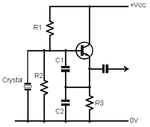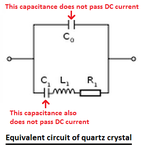neazoi
Advanced Member level 6
Will a quartz crystal block DC?
Also, what will happen if I apply DC in a crystal that resonates in an oscillator? Will it's Q be affected signifficantly so that it affects the oscillation?
Also, what will happen if I apply DC in a crystal that resonates in an oscillator? Will it's Q be affected signifficantly so that it affects the oscillation?

